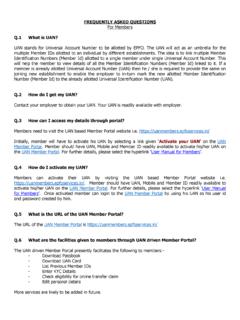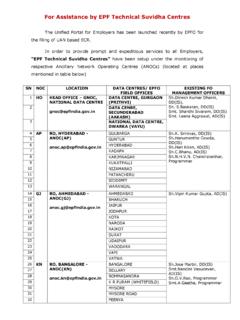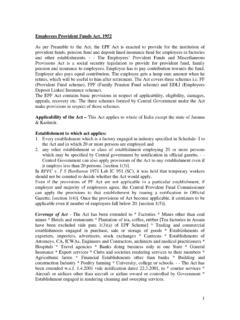Transcription of THE EMPLOYEES’ PROVIDENT FUNDS AND …
1 1 THE EMPLOYEES PROVIDENT FUNDS AND miscellaneous provisions ACT, 1952 _____ ARRANGEMENT OF SECTIONS _____ CHAPTER I PRELIMINARY SECTIONS 1. Short title, extent and application. 2. Definitions. 2A. Establishment to include all departments and branches. 3. Power to apply Act to an establishment which has a common PROVIDENT fund with another establishment. 4. Power to add to Schedule I. 5. Employees PROVIDENT fund Schemes. 5A. Central Board. 5AA. Executive Committee. 5B. State Board. 5C. Board of Trustees to be body corporate. 5D. Appointment of officers. 5DD. Acts and proceedings of the Central Board or its Executive Committee or the State Board not to be invalidated on certain grounds. 5E. Delegation. 6. Contributions and matters which may be provided for in Schemes. 6A. Employees Pension Scheme. 6C. Employees Deposit-linked Insurance Scheme. 6D. Laying of schemes before Parliament. 7. Modification of Scheme.
2 7A. Determination of moneys due from employers. 7B. Review of orders passed under section 7A. 7C. Determination of escaped amount. 7D. Tribunal. 7E. [Omitted.]. 7F. [Omitted.]. 7G. [Omitted.]. 7H. [Omitted.]. 7-I. Appeals to Tribunal. 7J. Procedure of Tribunals. 7K. Right of appellant to take assistance of legal practitioner and of Government, etc., to appoint presenting officers. 7L. Orders of Tribunal. 7M. [Omitted.]. 2 SECTIONS 7N. [Omitted.]. 7-O. Deposit of amount due, on filing appeal. 7P. Transfer of certain applications to Tribunals. 7Q. Interest payable by the employer. 8. Mode of recovery of moneys due from employers. 8A. Recovery of moneys by employers and contractors. 8B. Issue of certificate to the Recovery Officer. 8C. Recovery Officer to whom certificate is to be forwarded. 8D. Validity of certificate and amendment thereof. 8E. Stay of proceedings under certificate and amendment or withdrawal thereof.
3 8F. Other modes of recovery. 8G. Application of certain provisions of Income-tax Act. 9. fund to be recognised under Act 11 of 1922. 10. Protection against attachment. 11. Priority of payment of contributions over other debts. 12. Employer not to reduce wages, etc. 13. Inspectors. 14. Penalties. 14A. Offences by companies. 14AA. Enhanced punishment in certain cases after previous conviction. 14AB. Certain offences to be cognizable. 14AC. Cognizance and trial of offences. 14B. Power to recover damages. 14C. Power of court to make orders. 15. Special provisions relating to existing PROVIDENT FUNDS . 16. Act not to apply to certain establishments. 16A. Authorising certain employers to maintain PROVIDENT fund accounts. 17. Power to exempt. 17A. Transfer of accounts. 17AA. Act to have effect notwithstanding anything contained in Act 31 of 1956. 17B. Liability in case of transfer of establishment. 18. Protection of action taken in good faith.
4 18A. Authorities and inspector to be public servant. 19. Delegation of powers. 20. Power of Central Government to give directions. 21. Power to make rules. 22. Power to remove difficulties. SCHEDULE I. SCHEDULE II. SCHEDULE III. SCHEDULE IV. 3 THE EMPLOYEES PROVIDENT FUNDS AND miscellaneous provisions ACT, 1952 ACT NO. 19 OF 19521 [4th March, 1952 .] An Act to provide for the institution of PROVIDENT FUNDS 2[,3[pension fund ] and deposit-linked insurance fund ] for employees in factories and other establishments. BE it enacted by Parliament as follows: 1. Short title, extent and application. 4[(1) This Act may be called the Employees PROVIDENT FUNDS and miscellaneous provisions Act, 1952 .] (2) It extends to the whole of India 5**. 6[(3) Subject to the provisions contained in section 16, it applies (a) to every establishment which is a factory engaged in any industry specified in Schedule I and in which 7[twenty] or more persons are employed, and (b) to any other establishment employing 6[twenty] or more persons or class of such establishments which the Central Government may, by notification in the Official Gazette, specify in this behalf: Provided that the Central Government may, after giving not less than two months notice of its intention so to do, by notification in the Official Gazette, apply the provisions of this Act to any establishment employing such number of persons less than 6[twenty] as may be specified in the notification.]
5 ] 8[(4) Notwithstanding anything contained in sub-section (3) of this section or sub-section (1) of section 16, where it appears to the Central PROVIDENT fund Commissioner, whether on an application made to him in this behalf or otherwise, that the employer and the majority of employees in relation to any establishment have agreed that the provisions of this Act should be made applicable to the establishment, he may, by notification in the Official Gazette, apply the provisions of this Act to that establishment on and from the date of such agreement or from any subsequent date specified in such agreement.] 9[(5) An establishment to which this Act applies shall continue to be governed by this Act notwithstanding that the number of persons employed therein at any time falls below twenty.] 10* * * * * 2.
6 Definitions. In this Act, unless the context otherwise requires, 11[(a) appropriate Government means 1. This Act has been extended to Dadra and Nagar Haveli by Reg. 6 of 1963, s. 2 and the First Schedule: Pondicherry by Reg. 7 of 1963, s. 3 and the First Schedule and Goa, Daman and Diu by Reg. 11 of 1963, s. 3 and Schedule (1-7-1964). 2. Subs. by Act 99 of 1976, s. 16, for and family pension fund ( 1-8-1976). 3. Subs. by Act 25 of 1996, s. 2, for family pension fund ( 16-11-1995). 4. Subs. by Act 99 of 1976, s. 17, for sub-section (1) ( 1-8-1976). 5. The Words except the State of Jammu and Kashmir omitted by Act 34 of 2019, s. 95 and the Fifth Schedule ( 31-10-2019) and extended to the Union territory of Jammu and Kashmir and Union territory of Ladakh by notification No. 3962(E), Part II-section 3-Sub-section (ii) dated 31-10-20 ( 1-1-2020).]
7 6. Subs. by Act 94 of 1956, s. 2, for sub-section (3). 7. Subs. by Act 46 of 1960, s. 2, for fifty ( 31-12-1960). 8. Subs. by Act 33 of 1988, s. 2, for sub-section (4) ( 1-8-1988). 9. Ins. by Act 46 of 1960, s. 2 ( 31-12-1960). 10. The proviso omitted by Act 16 of 1971, s. 13 ( 23-4-1971). 11. Subs. by Act 22 of 1958, s. 2, for clause (a). 4 (i) in relation to an establishment belonging to, or under the control of, the Central Government or in relation to an establishment connected with a railway company, a major port, a mine or an oilfield or a controlled industry, 1[or in relation to an establishment having departments or branches in more than one State,] the Central Government; and (ii) in relation to any other establishment, the State Government;] 2[(aa) authorised officer means the Central PROVIDENT fund Commissioner, Additional Central PROVIDENT fund Commissioner, Deputy PROVIDENT fund Commissioner, Regional PROVIDENT fund Commissioner or such other officer as may be authorised by the Central Government, by notification in the Official Gazette.
8 ] (b) basic wages means all emoluments which are earned by an employee while on duty or 3[ on leave or on holidays with wages in either case] in accordance with the terms of the contract of employment and which are paid or payable in cash to him, but does not include (i) the cash value of any food concession; (ii) any dearness allowance (that is to say, all cash payments by whatever name called paid to an employee on account of a rise in the cost of living), house-rent allowance, overtime allowance, bonus commission or any other similar allowance payable to the employee in respect of his employment or of work done in such employment; (iii) any presents made by the employer; (c) contribution means a contribution payable in respect of a member under a Scheme 4[or the contribution payable in respect of an employee to whom the Insurance Scheme applies]; (d) controlled industry means any industry the control of which by the Union has been declared by a Central Act to be expedient in the public interest; 5[(e) employer means (i) in relation to an establishment which is a factory, the owner or occupier of the factory, including the agent of such owner or occupier, the legal representative of a deceased owner or occupier and, where a person has been named as a manager of the factory under clause (f) of sub-section (1) of section 7 of the Factories Act, 1948 (63 of 1948), the person so named.
9 And (ii) in relation to any other establishment, the person who, or the authority which, has the ultimate control over the affairs of the establishment, and where the said affairs are entrusted to a manager, managing director or managing agent, such manager, managing director or managing agent;] (f) employee means any person who is employed for wages in any kind of work, manual or otherwise, in or in connection with the work of 6[an establishment], and who gets his wages directly or indirectly from the employer, 7[and includes any person (i) employed by or through a contractor in or in connection with the work of the establishment; 1. Ins. by Act 22 of 1965, s. 2 ( 24-11-1964). 2. Ins. by Act 33 of 1988, s. 3 ( 1-8-1988). 3. Subs. by s. 3, ibid., for on leave with wages ( 1-8-1988).
10 4. Ins. by Act 99 of 1976, s. 18 ( 1-8-1976). 5. Subs. by Act 94 of 1956, s. 4, for clause (e). 6. Subs. by ibid., s. 3, for a factory . 7. Subs. by Act 33 of 1988, s. 3, for and includes any person employed by or through a contractor in or in connection with the work of the establishment ( 1-8-1988). 5 (ii) engaged as an apprentice, not being an apprentice engaged under the Apprentices Act, 1961 (52 of 1961), or under the standing orders of the establishment;] 1[(ff) exempted employee means an employee to whom a Scheme 2[or the Insurance Scheme, as the case may be,] would, but for the exemption granted under3** section 17, have applied; (fff) exempted 4[establishment] means 5[an establishment] in respect of which an exemption has been granted under section 17 from the operation of all or any of the provisions of any Scheme 2[or the Insurance Scheme, as the case may be], whether such exemption has been granted to the 4[establishment] as such or to any person or class of persons employed therein.


















